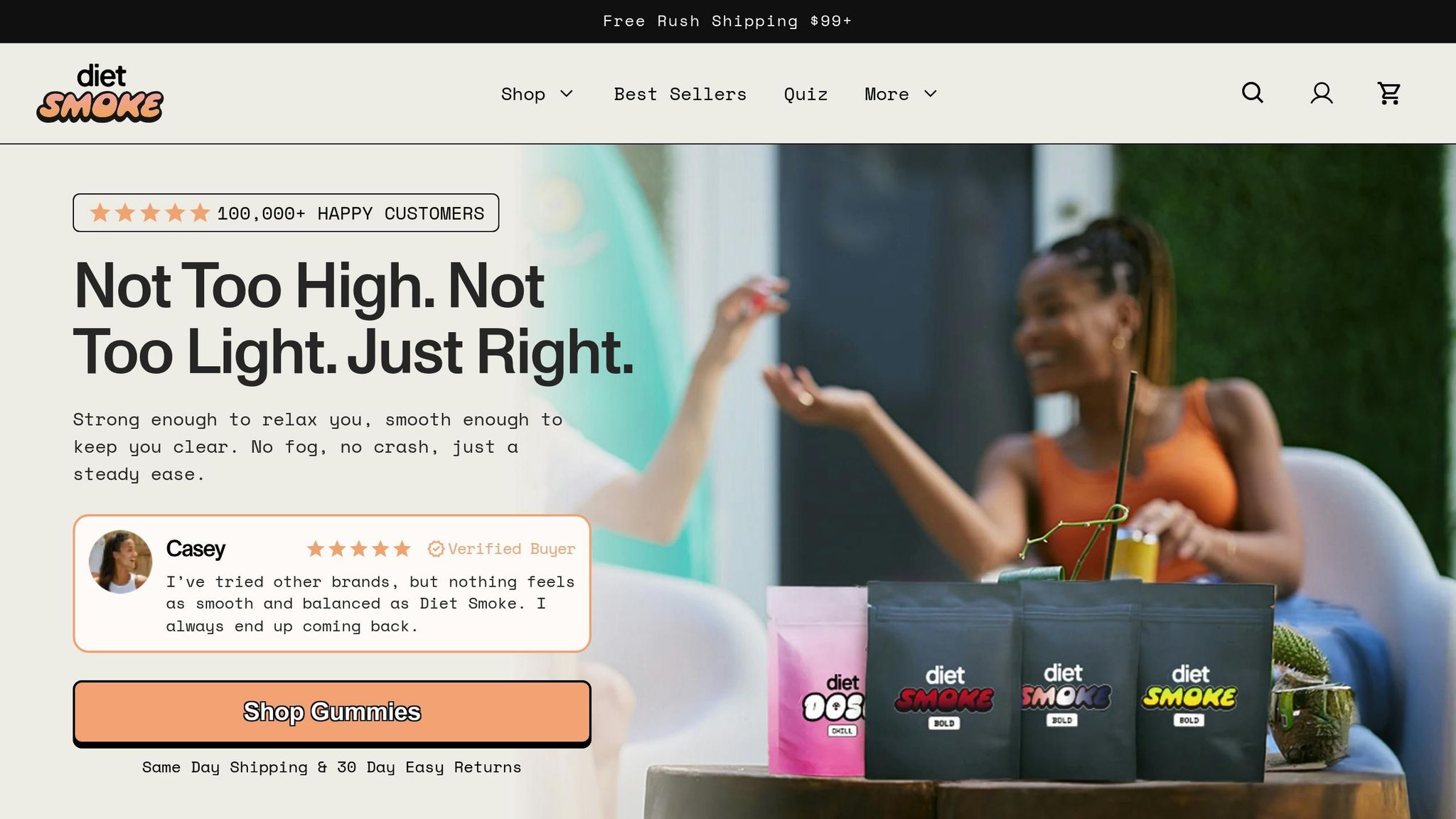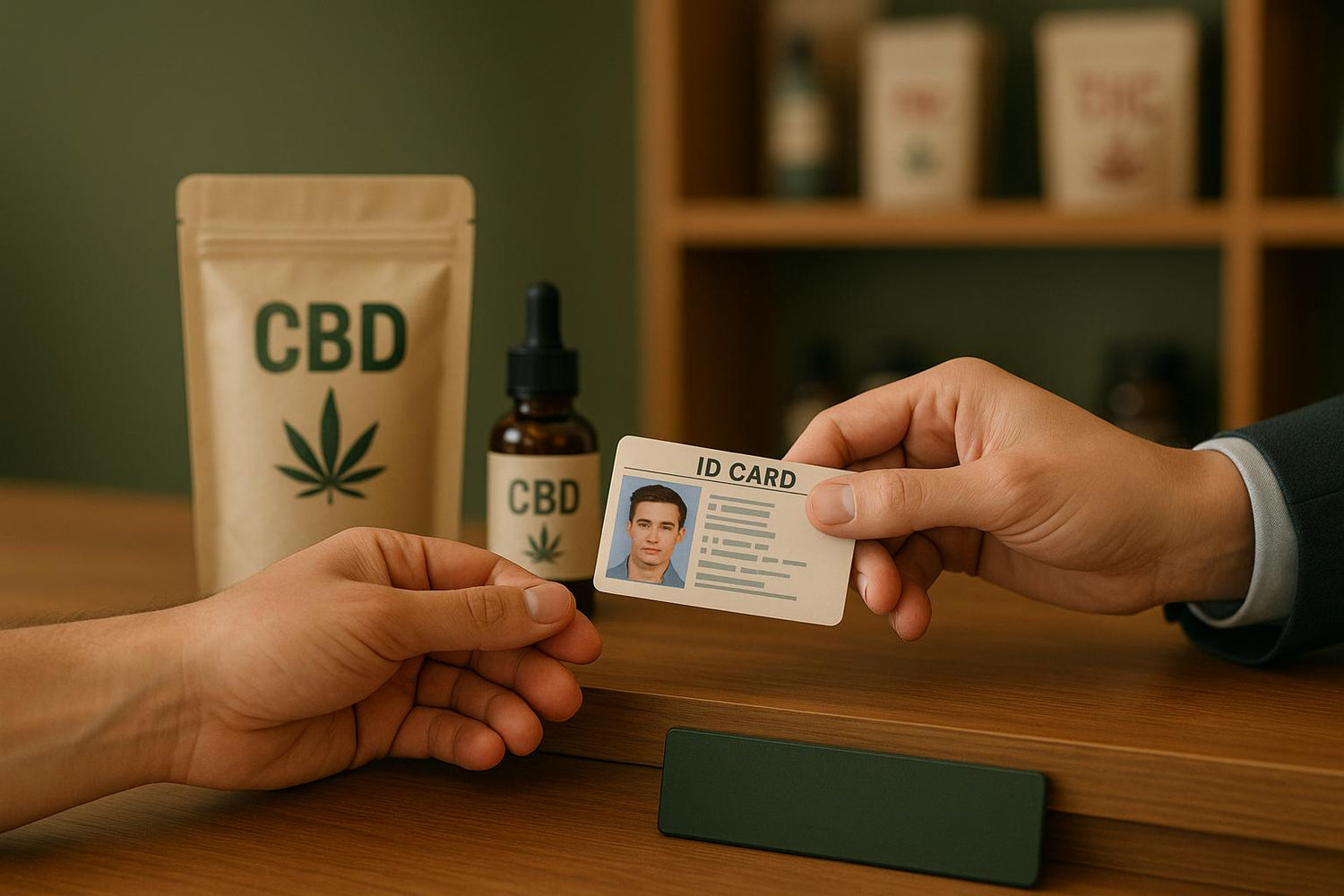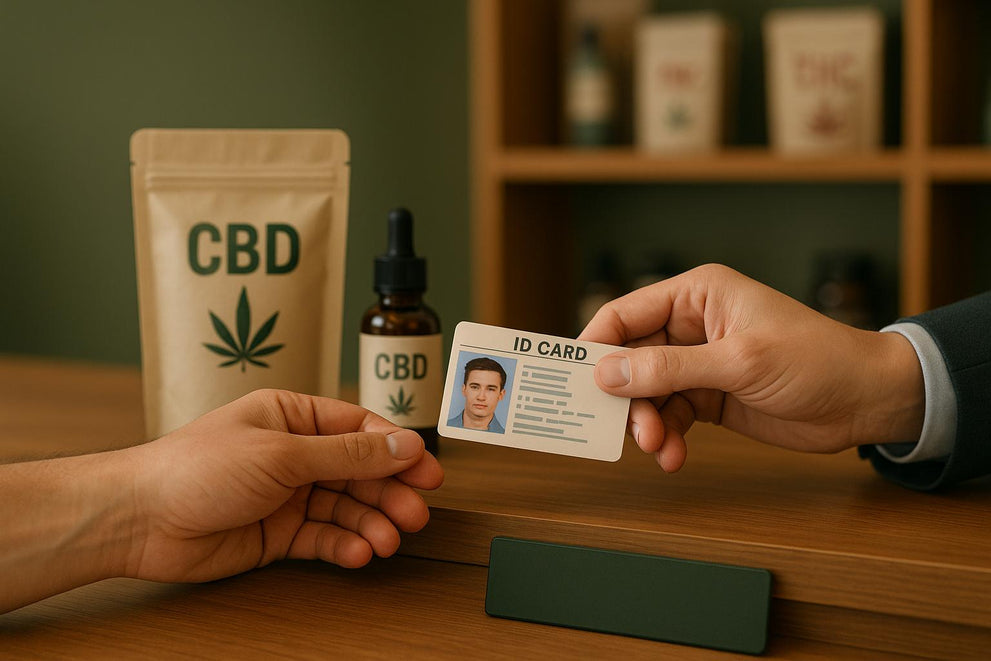THC and CBD products have different age restrictions due to their effects and legal status. THC, the psychoactive compound in cannabis, is generally restricted to adults 21+ for recreational use, with medical use allowed at 18+ in many states (sometimes younger with parental and physician approval). CBD, a non-intoxicating compound, has less uniform rules: some states set the minimum age at 18, while others require buyers to be 21, particularly for inhalable products like vapes.
Key Points:
- THC: Federally illegal but state-regulated; recreational use is 21+ in most states, medical use varies.
- CBD: Federally legal under the 2018 Farm Bill but age limits (18+ or 21+) depend on the state and product type.
- Texas (2025): Raised the minimum age for THC and hemp-derived products to 21.
Quick Comparison
| Factor | THC Products | CBD Products |
|---|---|---|
| Federal Minimum Age | None (federally illegal) | None |
| State Minimum Age | 21 (recreational); 18+ (medical) | 18 or 21 (varies by state/product type) |
| ID Verification | Mandatory, strict enforcement | Varies: strict for vapes/smokables, less for other forms |
| Online Sales | Restricted, ID required | Allowed, ID required |
Retailers face stricter enforcement for THC, including ID checks and penalties for non-compliance. CBD rules, while looser, are tightening in some states to address youth access concerns.
Texas governor sets minimum age to buy THC products to 21
THC Age Restrictions in the United States
THC age restrictions in the U.S. are shaped by a mix of federal and state laws. Federally, THC remains a Schedule I controlled substance, meaning its recreational use is illegal nationwide. Since the federal government doesn't regulate minimum purchase ages, states set their own rules for both recreational and medical use.
State Age Requirements
For recreational cannabis, most states that have legalized its use set the minimum age at 21. As of 2025, 24 states and Washington, D.C. allow recreational cannabis sales, but none permit these sales to individuals under 21.
Medical marijuana laws, however, differ significantly. Thirty-seven states operate medical marijuana programs, with most allowing individuals 18 or older to make purchases independently. Minors can access medical THC products, but only with parental consent and a physician's recommendation. South Dakota imposes additional restrictions, prohibiting registered patients under 21 from smoking THC products.
These varying state laws highlight the complexity of THC regulations and the ongoing adjustments being made.
Recent Rule Changes
States continue to refine THC age restrictions to address concerns about youth access and public health. In 2025, Texas introduced a notable change when Governor Abbott signed an executive order raising the minimum age to 21 for purchasing consumable hemp products containing THC. This policy targeted items like gummies, beverages, and vapes, which had previously been available to 18-year-olds. Texas’ decision reflects a broader push for stricter age regulations.
State agencies have also stepped up enforcement efforts, penalizing retailers who fail to verify customer ages. Consequences for non-compliance include fines, license suspensions, or even criminal charges. Retailers are now required to check government-issued IDs for all THC purchases, with online orders mandating age verification upon delivery.
Advocates for these tighter controls emphasize the importance of protecting adolescent brain development and reducing mental health risks. However, critics argue that stricter age limits might drive minors toward unregulated and potentially unsafe sources. The debate continues as states balance public health priorities with enforcement challenges.
CBD Age Restrictions in the United States
CBD operates under a different set of regulations compared to THC products. Its legal framework is shaped by federal hemp laws, state-specific cannabis rules, and the policies of individual retailers. These layers of regulation determine the age guidelines for purchasing CBD across the country.
Federal Legal Status
Under the 2018 Farm Bill, hemp-derived CBD containing no more than 0.3% THC is federally legal. However, federal law does not establish a nationwide minimum age for buying CBD products. Unlike alcohol or tobacco, CBD sales are primarily governed by state and local regulations. The FDA also prohibits adding CBD to traditional foods or dietary supplements.
State Laws
The legal age for purchasing CBD varies by state. Some states set the minimum age at 18, while others require buyers to be 21 - especially for inhalable products like vapes or smokable CBD. For instance, states like California, New York, and Oregon enforce a 21-and-over rule for these products, largely due to concerns about youth vaping. Non-smokable options such as oils, tinctures, and topicals often face fewer restrictions. Additionally, some states allow minors to access CBD for medical use, provided they have the necessary documentation and parental consent.
Online Sales and Enforcement
The rise of online CBD sales has introduced unique challenges in enforcing age restrictions. Many retailers attempt to verify age through tools like government-issued ID checks or self-reported birthdates during checkout. However, these methods often lack consistency and reliability. Adding to the complexity, USPS regulations limit the mailing of vape products to consumers, further impacting the sale of inhalable CBD formats. While online sales continue to grow, ensuring consistent enforcement of age restrictions remains a difficult task.
THC vs CBD Age Restrictions: Main Differences
This section dives into the regulatory distinctions between THC and CBD products, focusing on how age restrictions are applied. While both types of products are subject to age limits, the rules governing them differ significantly. THC products face much stricter federal oversight, whereas CBD operates under a complex mix of state and local regulations.
At the federal level, the differences are stark: THC is classified as a Schedule I controlled substance, meaning non-prescription sales are federally prohibited outside of state-approved medical or recreational programs. In contrast, CBD's legality comes from the Farm Bill, which legalized hemp-derived CBD but did not establish a federal minimum age for its use. These variations influence how regulations are enforced, as outlined below.
Comparison Table
| Factor | THC Products | CBD Products |
|---|---|---|
| Federal Minimum Age | None (federally illegal) | None |
| State Minimum Age | 21 (recreational); 18+ (medical, varies) | 18 or 21 (varies by state and product type) |
| ID Verification | Mandatory, strict enforcement | Varies: strict for vapes/smokables, less for other forms |
| Authority | State programs, strict oversight | State laws, varied enforcement |
| Online Sales | Restricted, ID required | Allowed, ID required |
For THC, government-issued ID verification is a must, with heavy penalties for non-compliance. On the other hand, CBD enforcement is far less consistent. Some states require ID checks for specific formats like vapes or smokables, while others leave it up to retailers, leading to varying practices even within the same state.
Recent policy changes suggest a trend toward tighter controls. For example, Texas Governor Abbott’s 2025 executive order raised the minimum age for THC and consumable hemp products to 21, mandated government-issued ID checks, and increased enforcement protocols for retailers. This shift mirrors the approach used for alcohol and tobacco regulations, aiming for uniformity across age-restricted products.
Medical vs Recreational Use
Age restrictions also depend on whether the product is for medical or recreational use.
For THC products, medical cannabis programs often allow access for individuals under 21, sometimes even for minors, provided there’s physician approval and parental consent. Recreational THC, however, is almost always limited to adults aged 21 and over in states where it is legal.
CBD products follow a looser structure. Minors may use CBD for medical purposes under supervision, but retail sales to minors - particularly for inhalable products - are generally restricted. Unlike THC, CBD’s medical use lacks formal programs or clear documentation requirements, making enforcement more challenging.
Minors participating in state medical cannabis programs typically need parental consent and a physician’s recommendation, while individuals 18 and older can apply for medical cards independently.
For retailers, the patchwork of state and local laws creates enforcement headaches. Age requirements often vary by product type, and robust ID verification systems are essential to avoid penalties. As regulations tighten, businesses are increasingly investing in better record-keeping and staff training to stay compliant across both THC and CBD markets.
sbb-itb-0d19bd1
Current Trends and Debates
Continuing from earlier discussions, current trends show an increasing emphasis on protecting young people and holding the market accountable. Recent legislation has focused on tightening age restrictions for THC and CBD products to address these concerns.
Higher Age Limits
Most states set the legal age for purchasing THC products at 21, while CBD products often fall between 18 and 21, depending on the type. However, there’s ongoing debate about raising the minimum age to 25. This stems from research suggesting that early exposure to THC may heighten risks of psychosis, paranoia, and dependency.
State-level studies continue to shape these policies. Some argue that stricter age limits could negatively impact legitimate businesses and make it harder for adults to access these products. These discussions are fueling broader debates about balancing public health with market freedom.
Risks to Minors
Concerns about minors gaining access to THC products are growing. Reports highlight increasing cases of underage use, which have been linked to serious risks like psychosis and hospitalizations. Online sales, in particular, face criticism for less reliable age verification compared to in-store purchases. Unregulated retailers are also less likely to enforce age restrictions than licensed dispensaries.
Public health advocates are pushing for stronger measures to address these issues. They suggest implementing more rigorous age verification systems, clearer product labeling, and educational campaigns aimed at preventing underage access. Additionally, product formats are under scrutiny - smokables and vapes face more criticism for their respiratory health risks, while topicals and tinctures are seen as lower risk.
In response, state legislatures are stepping up enforcement through mandatory ID checks, improved recordkeeping, and higher licensing fees. Some states are also considering stricter packaging rules and potency caps to minimize harm. As new data on youth usage and health impacts emerges, these debates will likely grow and influence future regulations.
Diet Smoke's Age Verification Process

Diet Smoke prioritizes strict adherence to age regulations in the cannabis industry, ensuring both compliance with the law and a seamless shopping experience for its customers.
How We Verify Customer Age
To meet regulatory requirements, Diet Smoke uses government-issued ID checks at the point of sale. This approach was updated in response to a recent executive order mandating ID verification for THC purchases in Texas, ensuring all transactions comply with state laws.
Online, Diet Smoke employs multiple age-check measures. Customers must confirm their age before accessing product pages, and third-party verification services cross-check submitted information against official databases. These safeguards ensure only eligible buyers can complete their purchases.
The company remains vigilant about state-specific regulations. For example, while the minimum age for THC products is generally 21 in states like Texas, CBD products may have different age requirements depending on the product type and location. Diet Smoke continuously updates its online and in-store protocols to reflect the latest legal standards.
For online transactions, encrypted systems require customers to verify their age before viewing detailed product information or completing a purchase. Additionally, certain products, such as vapes, may be restricted from shipping based on federal and state mailing laws. Comprehensive transaction records are maintained, ensuring transparency and compliance with state inspections.
These measures reflect Diet Smoke's broader commitment to maintaining legal compliance and ensuring product integrity.
Our Products and Legal Compliance
In addition to rigorous age verification, Diet Smoke maintains high product standards to ensure customer safety and trust. All products meet federal hemp guidelines. The lineup includes Delta-8 THC, Delta-9 THC, CBD gummies, vapes, pre-rolls, and mushroom gummies, offering options for relaxation, sleep, focus, and energy.
Each product undergoes lab testing to confirm cannabinoid levels and compliance with federal standards. Clear labeling provides detailed information on content and serving sizes, helping customers make informed decisions.
Diet Smoke also offers discreet delivery, allowing eligible customers to receive products without needing a medical card. The website and checkout process clearly outline age requirements and state-specific regulations, ensuring customers understand the rules before making a purchase.
Conclusion
The rules surrounding age restrictions for THC and CBD products form a patchwork of federal and state guidelines that both consumers and retailers need to navigate carefully. Understanding these regulations is not only important for staying compliant with the law but also plays a role in promoting public health and safety.
When it comes to THC products, the restrictions are generally more consistent. Recreational use is typically limited to individuals aged 21 and older, while medical THC can often be accessed by patients as young as 18, provided they have the necessary documentation. Meanwhile, CBD regulations vary widely by state, with age limits commonly set between 18 and 21.
The method of consumption also influences age restrictions. Products that are smokable or vape-based are almost always restricted to those 21 and older, reflecting additional concerns about their impact on younger users.
Main Points
Looking at the broader trends, many states are leaning toward stricter age limits, especially for products that can be inhaled or smoked. For example, inhalable CBD products are increasingly being restricted to individuals aged 21 and older. This reflects growing concerns about the safety of younger users, particularly regarding the cognitive risks associated with THC and the unknown long-term effects of CBD on adolescents.
The distinction between recreational and medical use is also a critical factor. Medical cannabis often provides younger patients with access to these products under the guidance of healthcare professionals, balancing therapeutic benefits with the need to safeguard developing minds. In contrast, recreational cannabis remains strictly for adults, reflecting a cautious approach to its broader use.
Enforcement plays a key role in maintaining these age restrictions. Companies like Diet Smoke demonstrate their commitment to responsible practices by implementing robust age verification systems. These include checks of government-issued IDs and third-party verification services to ensure that underage individuals cannot make purchases. Efforts like these highlight the importance of accountability in the industry.
As cannabis laws continue to change, staying informed about local regulations is essential for both consumers and businesses. Keeping up with these evolving policies ensures compliance and helps support responsible use.
FAQs
Why do THC and CBD products have different age restrictions?
The rules around buying THC and CBD products mainly hinge on their effects and legal status. THC, the psychoactive ingredient in cannabis, is known for causing intoxication and is subject to stricter regulations. In most states, you need to be at least 21 years old to purchase THC products. CBD, however, doesn’t have intoxicating effects and is usually derived from hemp, which is federally legal. Because of this, CBD products are often available to those 18 and older, though the exact age can vary depending on the state.
Make sure to review your local laws, as regulations for both THC and CBD products can differ by location. Always buy from reliable sources that follow both federal and state rules.
How do online THC and CBD retailers verify age restrictions?
Online retailers selling THC and CBD products take several steps to comply with age restriction laws. These measures often include asking customers to confirm their age during checkout and using third-party age verification tools to validate buyer information. In some cases, retailers may even require a government-issued ID to ensure the purchaser meets the legal age requirements.
Take Diet Smoke as an example. They provide a variety of federally legal THC and CBD products, such as Delta-8 THC, Delta-9 THC, CBD gummies, and vapes. Their products are shipped discreetly and adhere to all legal regulations, ensuring that only eligible customers can access them. By focusing on safety and following the rules, online retailers play a key role in providing responsible access to cannabis products.
How do state laws affect age restrictions for THC and CBD products?
State laws are key in shaping how age restrictions for THC and CBD products are applied. While federal guidelines establish a general framework, states have the power to enforce stricter rules, which can differ widely based on the product type and its THC content.
For instance, in some states, you can buy CBD products at age 18. However, products containing THC - like Delta-8 and Delta-9 THC - typically require buyers to be 21 or older. It's always important to review your local laws to make sure you're following the rules before making a purchase.



